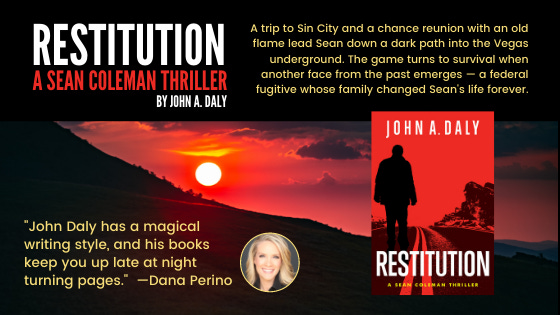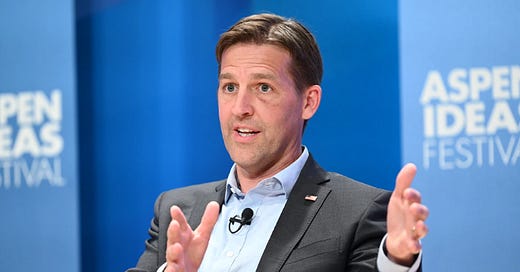
Republican Senator Ben Sasse from Nebraska was recently interviewed at the Aspen Security Forum about the challenges America faces as we navigate our way through the global digital revolution. It was a fascinating and insightful discussion, with Sasse highlighting the growing effects of digital technology on the American workforce, the U.S. economy, our national security, and our social culture. I highly recommend checking it out.
On the topic of how digital advances have changed our politics, Sasse had some particularly interesting things to say. He began by describing the “American idea” as being about things like universal human rights, principled pluralism, and private-sector entrepreneurship. He argued that government institutions and power are not supposed to be the center of life in our nation, but rather the frame that protects our freedoms and allows opportunity.
The senator, who's a conservative, believes that much of today’s generation has largely lost that understanding, in part because civics are no longer taught in this country — at least not the way the used to be. In their absence, technology has filled the void.
“It turns out that in technology, when you can create a narcissistic feedback loop that makes everybody feel like they’re a victim all day every day, the American experiment looks pretty fragile,” said Sasse.
That fragility is on display, he argues, in how every partisan fight in Washington is now portrayed as being "existential," and he blames some of his colleagues in DC for that portrayal.
“Right now, we’ve got a bunch of chuckle-heads in politics who have confused themselves,” he said, “and they think, because they’re on this stage, and they want to do performative jack-assery all day every day, that that actually defines the center of meaning. And so, we’ve got a bunch of people on the left who aren’t sure they believe in the American idea, because they think the state should be the center, and we’ve got a bunch of reactive people on the right who’ve decided, 'Well if I don’t like their overreach, then what I should want to do is also use the powers of the state against my cultural opponents.'"
"That’s not America," the senator added.
The liberal sentiment Sasse described isn’t anything new in this country; it’s existed for decades. But the right-wing statist one is a relatively recent development, at least within the mainstream of the Republican Party. This populist strain, initially concocted by right-wing pundits and shady political strategists (like Steve Bannon) to serve as an ideological wrapper for Donald Trump’s autocratic instincts, has made political believers out of a number of elected and aspiring Republican leaders. We've seen it in the way some of them threaten “Big Tech” companies with punitive measures over content-moderation decisions, and how they try to dictate private businesses’ vaccine policies (just as President Biden has).
Just last month J.D. Vance, who’s running for the Republican U.S. Senate nomination in Ohio, even said to Tucker Carlson, “Why are we allowing the companies, the foundations that are destroying this country to receive tax preferences? Why don’t we seize the assets of the Ford Foundation, tax their assets, and give it to the people who’ve had their lives destroyed by their radical open borders agenda?”
Seize the assets?
Call me crazy, but I think it’s a really bad idea for both of our nation’s major political parties to be clinging to tenets of statism. And those on the right who’ve been referring to this movement — of what is effectively right-wing social justice — as “common-good conservatism” are completely unserious people.
Sasse argued that more and more Americans are recognizing that both parties are incredibly (and increasingly) weak, and not representative of the things that matter to them. The evidence, according to the senator, is front and center.
“The only thing that happens in American elections right now is that someone loses,” he said. “No one wins. It isn’t hard to understand this unless you’re a politically-addicted weirdo who watches cable news all day, or lives on blue-checkmark political Twitter, or is an officeholder yourself who got warped into thinking that you should stay forever in politics… Most of the American people know that politics right now is not aspirationally persuading anyone. What happens in every single election is: somebody overreaches, and then you have a backlash.”
Sasse pointed out that this didn’t use to be the case. “From 1952 until 1994, the House of Representatives turned over zero times. Since Bill Clinton’s election in 1992, every single second year of a new president’s term — with the sole exception of George W. Bush in the aftermath of 9/11 — every single time, the congress flipped two years into a new presidency, because that person didn’t win because they had some grand mandate to go and transform America. They won because the other person was regarded as a bigger jackass. Every election is basically a lesser-of-two-evils election right now.”
The senator included the Virginia gubernatorial race as further evidence, saying there wasn’t any doubt Youngkin was going to win, not after Terry McAuliffe aligned himself with the teacher’s unions who, as Sasse put it, said “screw you to parents,” most importantly on in-class learning. Sasse added, “Republicans didn’t win that race. McAuliffe decided to lose. And that’s what happens in every single election right now.”
He also made the point that while lots of party leaders and other political figures pay exceptionally close attention to cable news and social-media politics, both mediums are just echo chambers and neither are representative of “real people” who haven’t the time for, or interest in, either. Yet, those mediums, and not the larger populous, are what both parties are routinely responding to.
Sasse referred to our 24/7 media-fueled politics as the “Casino model,” and he described what that model is... “What happens in a casino?” he asked. “There are no clocks. All you want to do is to create people who are weirdos, who are addicts, who just endlessly scroll. And so, you lie to them, and the narcissistic feedback-loops on your feed tell you, ‘You know what? You’re a victim. Everybody’s mistreating you.’”
He’s right, of course, and it’s a big reason why I’ve weened myself off of cable news entirely… except for Fox News Sunday once a week, and some trips over to Mediaite for highlights (to keep with which junk-food is being tossed out to the tribes on any given day). And I must say that it’s amazing, once you’ve disconnected from it for a while, how cable news comes across as even crazier than you had thought.
The result of the Casino model, Sasse believes, is that most Americans have thrown in the towel on politics. This, he argued, has had the negative consequence of the “politically-addicted share of the country” getting more and more attention among a smaller group of people. The senator feels that the majority has been left thinking, “Oh, wait a minute, if I pay attention to politics, that means I have to pretend that it’s my whole world view and whole identity? Screw that. I’m going to check out. I want less and less to do with you people.”
That's not to say that they've "checked out" from participating in elections. They still vote. But that's largely the extent of their political engagement, and these days they view their electoral responsibility more as a form of protest than as a step toward a brighter future. Most Americans have little or no confidence in either side to do anything substantively productive or even positive, and once elected, lots of leaders seem eager to prove them right.
With less room for thoughtful adults to engage, the more bizarre, hyperbolic, and untethered from reality our politics have become. I see more and more evidence of it all the time, not just online but in my day to day life. Politically, if I take away the partisan and party elements, there are basically two types of people I know:
those who are clear-eyed and fairly informed on issues, but feel mostly unrepresented by elected leaders.
those who never stop talking about politics, insist that the next election could mean the end of the republic (if their side loses), and present every issue as an overly simplistic, racially-based, or conspiracy-driven partisan meme.
I'll give you one guess as to which type makes up the majority, and which type gets their news and views from the Casino model.
What can be done to get disaffected Americans back into the mix? I think the answer is stronger institutions. Our schools could renew their focus on civics education. Our political parties could grow backbones and actually hold the politicians who carry their banner to a sober set of standards and principles (like they once did). Likewise, our news-media institutions could recognize that they have a societal responsibility to the public, and enforce a bar of ethics (not views) that even their commentators are held to.
The problem is that I don't think there's an incentive structure for any of these changes, not when the power of citizenship is so widely taken for granted, and not when there's so much money and job security to be made off of polarization.
Still, one can dream.
Sean Coleman is back in John A. Daly's upcoming thriller novel, “Restitution.” Click here to pre-order.












